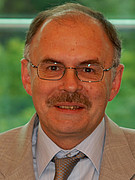Detailansicht
Toast der UNO zum Start des 1. Wetterballons [29.04.07]
Dr. Slobodan Nickovic, World meteorological Organization der UNODistinguished guests Ladies and Gentlemen,
I am honored to speak on the opening of the COPS project experiment performance.
Precipitation is the most difficult meteorological parameter to predict. Even more difficult if this is influenced by topography. Cloud and precipitation formation is so complex process that it represents a real challenge for the scientific community to better understand it and to improve its predictability. COPS, is a response to the societal requirements for better precipitation forecasts.
To achieve this goal, the first step is to understand in more details all the phases of cloud and precipitation process. COPS, by combining the most advanced remote sensing instruments with ground-based and airborne measurements in the experiment that just starts today, will substantially support better description of the process.
The second step is to wisely use data obtained in the campaign in the weather prediction models, but also to develop new model techniques capable to predict small-scale processes that drive the formation of precipitation. This all will hopefully lead to the final COPS goal - more accurate prediction of precipitation events and severe thunderstorms that are often associated with storms.
COPS is designed to support a large observation campaign and to make precipitation forecasts better in weather numerical models. In COPS, eleven universities are working together that includes leading scientists in Europe, US, and other countries. Ten research aircrafts will be engaged; a number of lidars, radars, ground-based stations and satellite data as well. Such ambitious experiment could not be done without international cooperation and without careful planning. The World Meteorological Organization considers COPS as one of its most important projects within the World Weather Research Programme.
I wish the COPS team a number of good cases of bad weather during the experiment. Certainly - "good" for the purpose of scientific assessments. I wish operators interesting data sets to collect. I also wish COPS scientists to discover unknown research facts and to use them for better precipitation predictions. I am sure this is the right way to make risks from bad weather smaller and to help so the public community.
I raise this glass of champagne to the success of COPS!
Toasts anderer Gemeinden:


